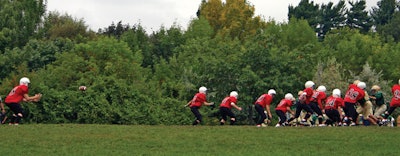
In my work providing individual counseling and performance consultation to NCAA Division I student-athletes, I am continually reminded of the unique difficulties they face during their competitive careers. In recent years, high school athletics has become increasingly competitive, as families invest unprecedented amounts of time and money in the pursuit of a college scholarship. Student-athletes are in a developmentally sensitive period in their lives, and mental health concerns tend to emerge under the immense stress and social pressures they endure.
 Paul Knackstedt
Paul Knackstedt
Mental health issues do not enter our awareness in the same way as physical injuries, with obvious accompanying symptoms. Student-athletes frequently respond to painful experiences and emotions by practicing the same coping skills that helped them reach a high level of success in sport — ignoring the pain and focusing on "being tough." In an athletics culture where mental toughness and grit are emphasized as the next new skill to train, student-athletes often feel like they need to go through their struggles alone and keep their pain in the dark. As a result, coaches need to be aware of the warning signs and symptoms of mental health issues that are common within the student-athlete population.
Common signs
Coaches typically achieve success due to their proficiency with the Xs and Os, but now more than ever, they need to be aware of which play to call when the biggest challenge is not an opposing team, but a concern about one of their own athletes' mental health. It is hard for anyone who has not experienced common mental health diagnoses such as depression or anxiety firsthand to identify symptoms. Most coaches have not been educated in this area and have little interest in counseling student-athletes when mental health concerns surface. For this reason, simply knowing the warning signs and having a direct referral source can be the best way to help an athlete in need.
Changes in cognition and behavior, even subtle cues, can indicate that a student-athlete may be struggling with more than just typical stress or adjustment issues. Common warning signs include uncharacteristic decline in academic or athletic performance, comments or thoughts of self-harm, increased negative self-talk, obsessive thoughts, lack of concentration, withdrawal from relationships with coaches or teammates, difficulty making decisions, impaired judgment and substance use.
Self-medication through substance use and abuse is a common way for student-athletes to cope with mental health concerns without addressing the root cause. When coaches start to see signs of substance use or begin to hear whispers of specific behaviors related to drug or alcohol use, they should be curious and consider this a possible sign of something bigger than simply wanting to have a good time.
Depression or anxiety may look different on the field than it would in real-life contexts. Other symptoms may include feeling overwhelmed, sudden mood swings, loss of interest or motivation in sports and academics, low self-worth, increased agitation or irritability, excessive worry or fear, insomnia or hypersomnia, drastic changes in appetite and weight, constant feelings of fatigue, frequent headaches, frequent gastrointestinal issues or sudden or recurrent injury.
Tips for Coaches
If we want to model a team culture in which addressing a personal vulnerability will be seen as strong and valuable, we need to know how to identify and respond when mental health concerns inevitably arise. Below are 10 tips for coaches to help address these concerns within their team and organizational structure.
1. Know the symptoms of common mental health diagnoses, such as depression, anxiety and ADHD.
2. Understand the mental health referral protocol at your institution and familiarize yourself with experienced local providers.
3. Speak with your mental health care professional to develop a strategy of how to help the athlete seek services.
4. Meet with the athlete, ensure privacy, and listen to their story without judgment.
5. Know your limits, but encourage the athlete to seek help by expressing genuine concern and compassion.
6. Ask the student-athlete to continue to check in with you about their progress, and have them consider completing a release of information with the mental health care provider to allow you communication with the provider, if appropriate.
7. Create a culture of openness and trust.
8. Manage emotional interactions and adjust accordingly the style of providing constructive feedback with student-athletes who are impacted by mental health issues.
9. Communicate with sports medicine staff and mental health care providers frequently and encourage multidisciplinary problem-solving when faced with difficult decisions.
10. Follow up with athletes who suffer injuries, especially if they are separated from the team during rehabilitation.
Coaches are an important part of the student-athlete's community. By staying informed, and knowing the signs of mental illness, coaches can play a supportive role in ensuring their players stay safe and healthy.
This article originally appeared in the April 2018 issue of Athletic Business with the title "How coaches can identify mental-health issues and support those in need." Athletic Business is a free magazine for professionals in the athletic, fitness and recreation industry. Click here to subscribe.




































